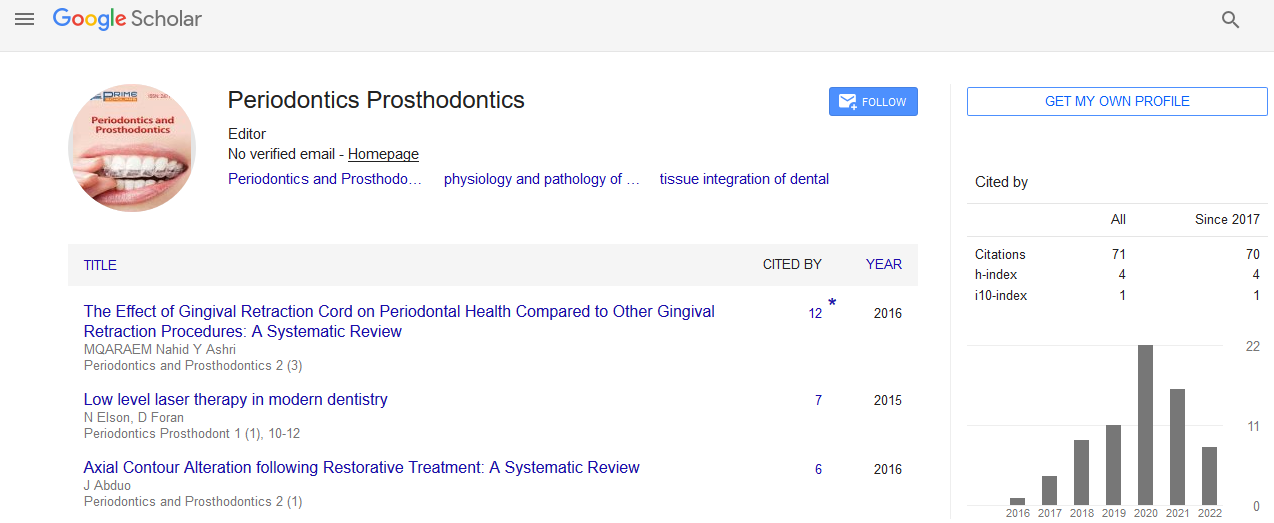Commentary Article - (2023) Volume 9, Issue 2
Advancements in Periodontal Research: A Glimpse into the Future of Oral Health
Gwen Johnson*
Department of Dental Sciences, University of Shanghai, China
*Correspondence:
Gwen Johnson,
Department of Dental Sciences, University of Shanghai,
China,
Email:
Received: 29-May-2023, Manuscript No. IPPDPD-23-17712;
Editor assigned: 31-May-2023, Pre QC No. IPPDPD-23-17712;
Reviewed: 14-Jul-2023, QC No. IPPDPD-23-17712;
Revised: 19-Jun-2023, Manuscript No. IPPDPD-23-17712;
Published:
26-Jun-2023, DOI: 10.36648/2471-3082.23.9.12
Description
Periodontal disease, commonly known as gum disease, has long
been a prevalent oral health issue affecting millions of people
worldwide. It encompasses a range of conditions that affect the
supporting structures of the teeth, including the gums, bone,
and ligaments. The consequences of untreated periodontal
disease can be severe, leading to tooth loss and even systemic
health problems. However, recent advancements in periodontal
research are shedding new light on prevention, diagnosis, and
treatment, offering hope for a healthier future in oral care. To
appreciate the significance of recent developments in periodontal
research, it’s essential to understand the disease itself. Periodontal
disease typically starts as gingivitis, characterized by red,
swollen gums that bleed easily. If left untreated, it can progress
to periodontitis, a more severe condition where the supporting
bone is damaged, leading to tooth mobility and loss. The human
oral microbiome is a complex ecosystem of bacteria, viruses, and
fungi that plays a significant role in oral health. Recent research
has focused on understanding how the oral microbiome influences
periodontal disease. By identifying specific bacterial strains
and their interactions, scientists are developing targeted therapies
to restore a healthy balance of oral flora. Genetic factors
play a crucial role in an individual’s susceptibility to periodontal
disease. Researchers have made significant strides in identifying
genetic markers associated with an increased risk of developing
gum disease. This information enables personalized treatment
plans and early intervention for those at higher risk. Advances
in personalized medicine have extended to dentistry. Periodontists
can now tailor treatment plans based on a patient’s genetic
makeup, oral microbiome, and other individual factors. This approach
maximizes treatment effectiveness while minimizing potential
side effects. Periodontal regeneration is an emerging field
that aims to restore the damaged periodontal tissues. Researchers
are developing innovative techniques and materials, such
as growth factors and stem cell therapy, to stimulate the regeneration
of lost bone and gum tissue. The immune system plays
a crucial role in fighting off infections, including those causing
periodontal disease. Scientists are exploring immunotherapies
to enhance the body’s natural defense mechanisms against gum
disease, potentially reducing the need for surgical interventions.
AI-powered algorithms are being developed to assist in the early
detection of periodontal disease. These tools can analyze dental
X-rays and clinical data, helping clinicians identify potential issues
before they become severe. The COVID-19 pandemic accelerated
the adoption of telehealth in dentistry. Teledentistry allows
patients to consult with dental professionals remotely, making
it easier for individuals to access care and receive guidance on
periodontal health. As periodontal research continues to evolve,
the future of oral health looks promising. Here are some potential
outcomes of ongoing research. With a better understanding
of the risk factors for periodontal disease, dentists can emphasize
preventive measures, including personalized oral hygiene
routines and dietary guidance. Genetic testing and AI-driven diagnostics
may enable early detection and treatment of periodontal
disease, reducing the need for invasive procedures. Tailored
treatments based on individual factors will become more common,
improving treatment outcomes and patient experiences.
Acknowledgement
None.
Conflict Of Interest
The authors declare that they have no conflict of interest.
Citation: Johnson G (2023) Advancements in Periodontal Research: A Glimpse into the Future of Oral Health. Periodon Prosthodon. 9:12.
Copyright: © 2023 Johnson G. This is an open-access article distributed under the terms of the Creative Commons Attribution
License, which permits unrestricted use, distribution, and reproduction in any medium, provided the original author and source
are credited

